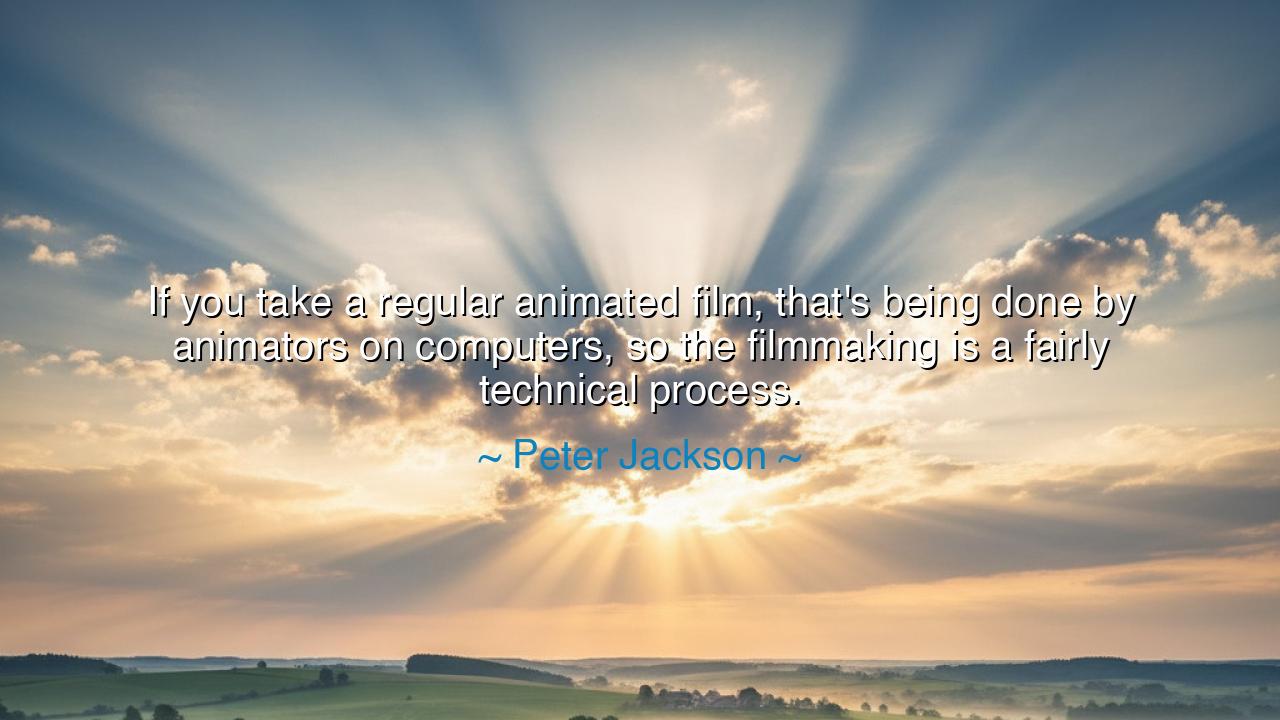
If you take a regular animated film, that's being done by
If you take a regular animated film, that's being done by animators on computers, so the filmmaking is a fairly technical process.






When Peter Jackson said, “If you take a regular animated film, that's being done by animators on computers, so the filmmaking is a fairly technical process,” he was not merely describing the mechanics of animation. He was revealing the hidden marriage between art and technology, between the heart that dreams and the machine that enables those dreams to breathe. In this statement lies the recognition that creation in the modern world is no longer born solely of brush, pen, or performance—but also of circuits, algorithms, and code. Jackson, a craftsman of both myth and machine, saw the dawn of a new creative era where filmmaking itself becomes an act of engineering as much as artistry.
The computer, in his words, is not a cold intruder into art but a new kind of chisel, capable of sculpting worlds that could never exist by hand alone. The animator, therefore, becomes both artist and architect—one who not only imagines but also engineers. In the ancient world, the storyteller’s tool was the spoken word; in Jackson’s time, it became the camera; and now, it is the processor. His quote marks the recognition that imagination has found new vessels, and that the divine act of creation has taken on digital form.
Yet beneath the surface of his statement lies a subtle warning. Jackson knew that the technical process could seduce the artist into forgetting the soul. The computer can calculate, but it cannot feel; it can render light, but not emotion. Thus, the filmmaker must remain vigilant—to let the heart lead, while the machine follows. In his own films—whether in the grand tapestries of The Lord of the Rings or the sweeping fantasy of King Kong—Jackson used technology not to replace humanity, but to magnify it. He transformed circuits into conduits of wonder, turning raw data into dreams.
History offers another mirror in the life of Walt Disney, who, decades before Jackson, revolutionized animation through invention. Disney’s studio built the multiplane camera, layering drawings to create depth and movement, merging art with engineering long before computers arrived. Both men share the same revelation: that technology in the hands of visionaries becomes poetry. For it is never the machine that creates greatness, but the imagination that wields it with purpose.
In this way, Jackson’s words remind us that creation evolves but never loses its essence. The ancients carved their myths into stone; the Renaissance painted them onto canvas; the modern dreamer programs them into pixels. Yet the flame remains the same—the longing to give shape to what the heart can see but the eye cannot. The computer, like the pen, is only as powerful as the spirit that moves it.
The filmmaker of today must therefore become a technological philosopher, uniting precision with passion. To understand how light bends, how motion flows, how the algorithm mimics thought—this is the new literacy of the creative age. But the truest wisdom is to remember that every frame, no matter how digitally crafted, must still carry the pulse of life. Without it, art becomes machinery—flawless yet hollow.
So let Jackson’s insight serve as a teaching for all who create in an age of machines: tools change, but truth endures. Whether your medium is clay or code, the soul must remain the source. Technology may be the instrument, but meaning is the melody, and only the heart can play it.
Final Lesson: The future of creation belongs to those who can fuse technical mastery with human emotion.
Practical Actions: Learn the tools of your craft deeply, but never let them silence your inner voice. Approach technology not as a master, but as a companion in creation. And remember always: while machines may draw the lines, it is the soul that gives them life.






AAdministratorAdministrator
Welcome, honored guests. Please leave a comment, we will respond soon